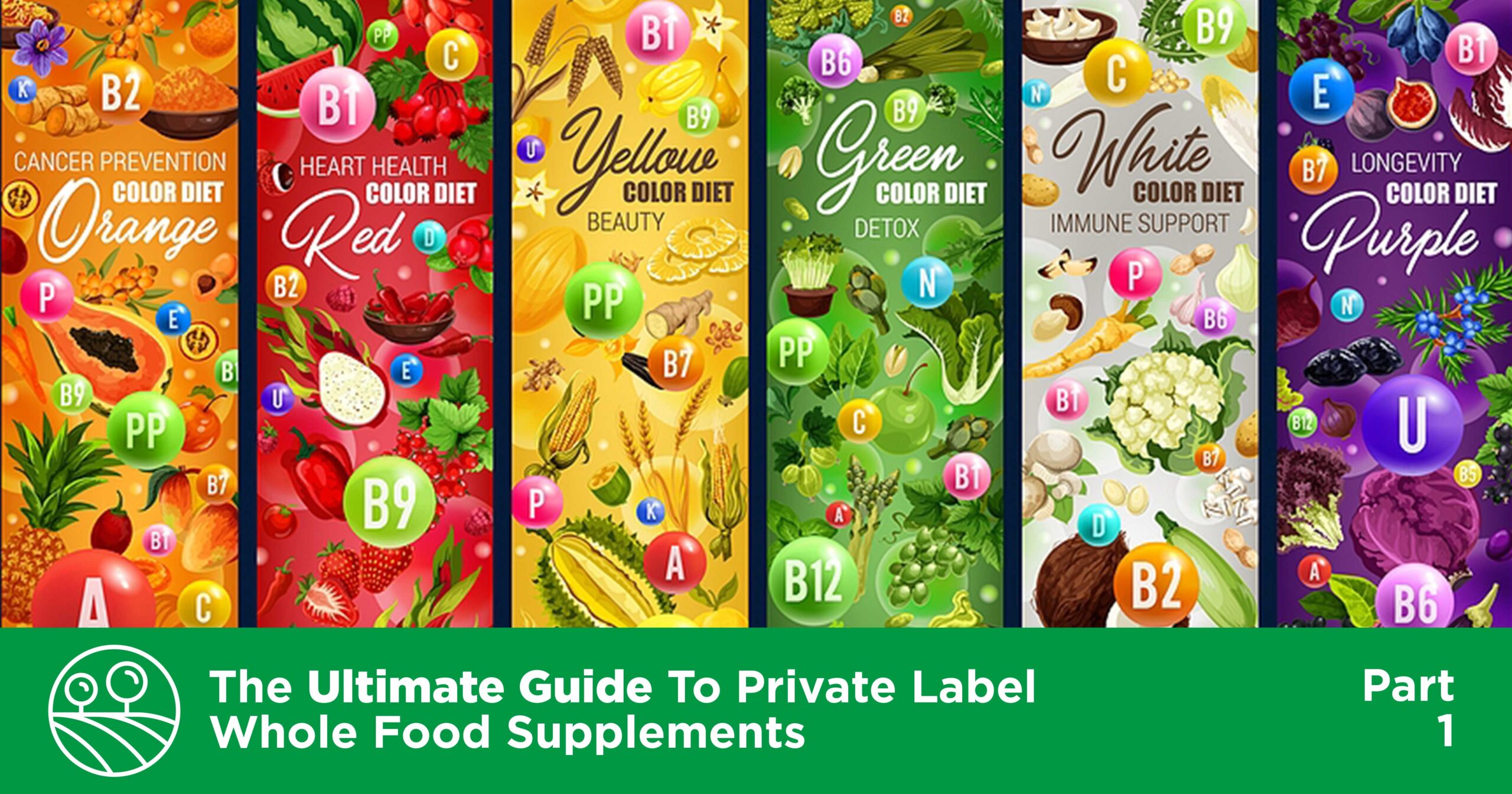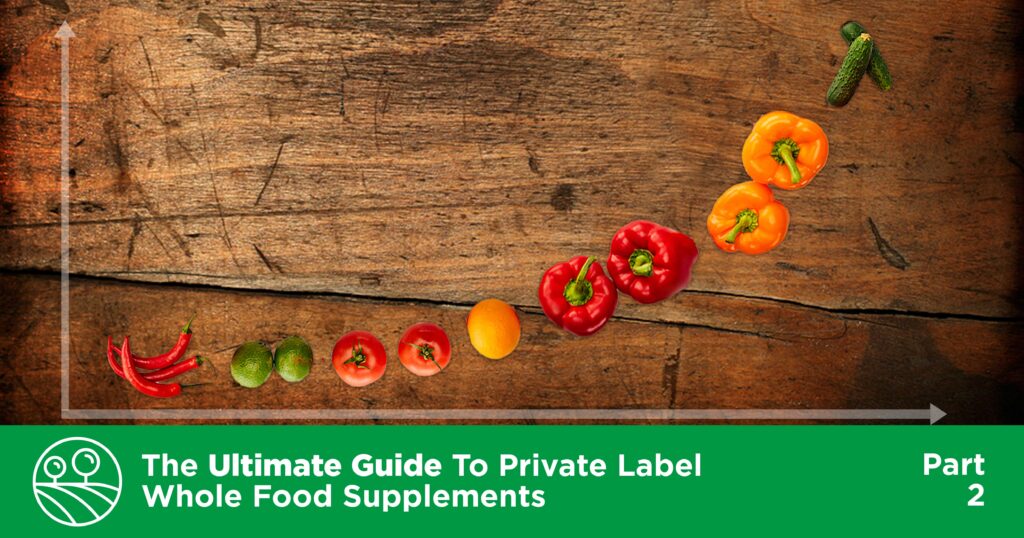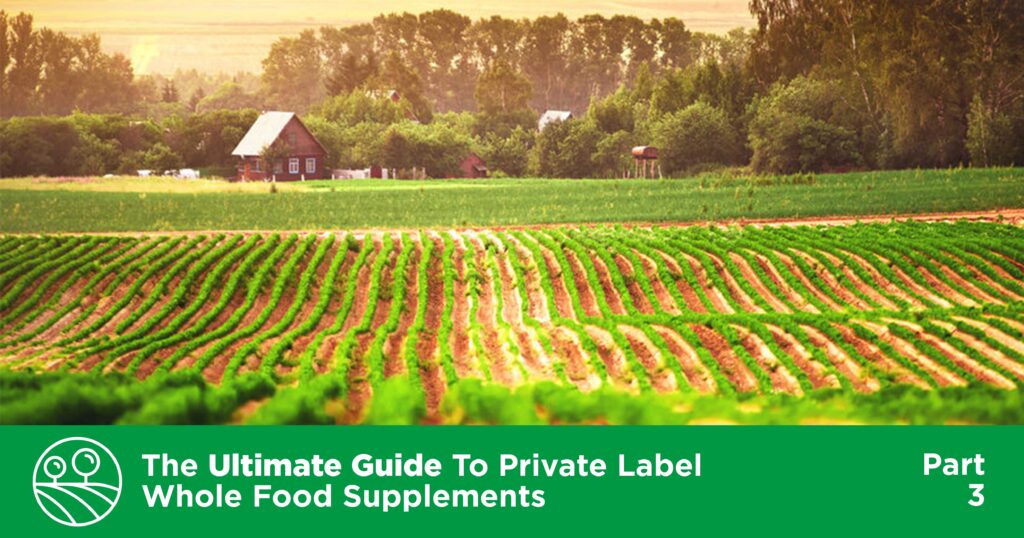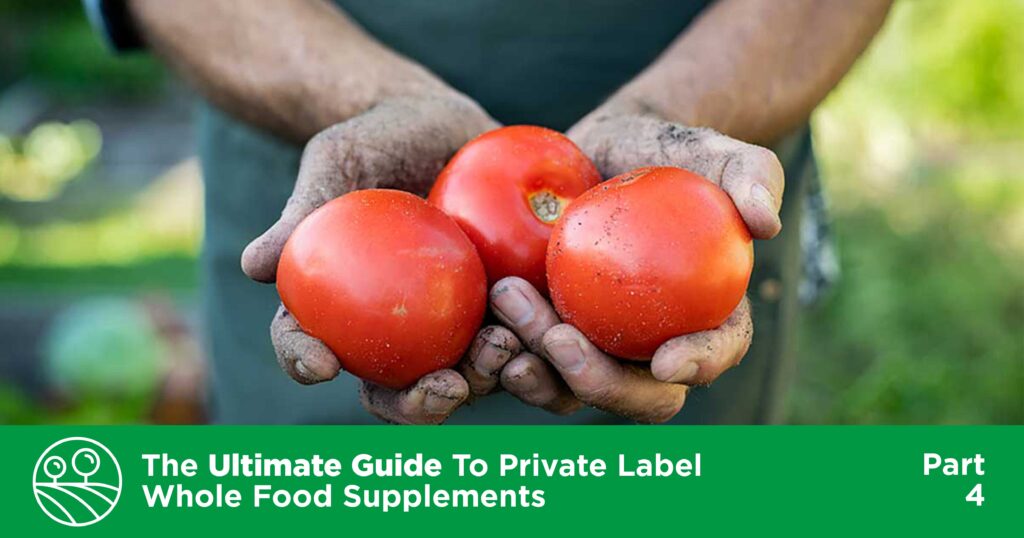This is part of our Ultimate Guide to Private Label Whole Food Supplements, a complete overview of the health benefits of Whole Food supplements, what makes them different from other types of supplements, why there is such a consumer demand for them, and how they are made with transparent, high-quality manufacturing processes.
“Let food be thy medicine.” – Hippocrates
In previous decades there has been a slow and steady change in the way Americans eat and produce food. Highly processed and refined foods that have had much of their nutrients destroyed have contributed to a high increase in chronic health conditions such as diabetes, obesity, and metabolic syndrome.
There are many options available today to reintroduce some of these important nutrients and micronutrients to the diet in the form of dietary supplements, but there are several different kinds and terms to understand when considering those options. In this article, we will be discussing the similarities and differences between “Synthetic”, “Organic”, and “Whole Food” supplements.
What Are Synthetic Supplements?
A synthetic ingredient is basically a chemically reconstructed copy of the natural molecule, with the goal of replicating that vitamin or mineral’s benefits. Over time, we have used Synthetic vitamins to substantially improve the human diet.
In the late 1800s, “miasma”, or “bad air” was thought to be the cause of illness and disease (such as cholera or plague). In the early 1900s, doctors and scientists began to promote “germ theory” instead, the belief that specific germs caused specific diseases. As a result, people began to sterilize food to get rid of the bacteria and mold that they thought would make them sick. These processes, such as sterilizing milk with heat which destroyed vitamin C, or milling grain which destroyed vital B vitamins, began to cause other health problems. This ultimately led to scientists discovering and identifying specific nutrients that were important in food and creating supplemental “vitamins” to replace these lost nutrients. These were basically synthetic versions of natural elements that were, and still are, necessary for good health. As the medical community became more aware of the obvious benefits provided by these supplements, their research continued, and over a century later, we have identified, isolated, and replicated almost every single component that is required for maintaining good health.
The majority of vitamins on the market today are made with synthetic ingredients. However, as our understanding of biology grows, so does our desire to improve our vitamins.
What Is the Difference Between Whole Food and Organic Supplements?
Whole Food supplements are made from primarily plant-based foods that are processed and refined as little as possible, if at all, before being consumed. Organic supplements come from foods that are produced by methods complying with the standards of organic farming, generally restricting the use of certain pesticides and fertilizers and employing various environmentally friendly protocols in their manufacturing process. A supplement can, and often does, have both an Organic and a Whole Food source, but the terms are not interchangeable, and they can be one without being the other.
Whole Food supplements are typically concentrated and/or dehydrated plants, such as whole grains, tubers, legumes, fruits, and vegetables. The vitamins found within these supplements are highly complex structures that combine a variety of nutrients, including enzymes, coenzymes, antioxidants, trace elements, and many other factors. The nutrients coming out of this whole-food form have not been taken apart or isolated from one another, providing a more complete package as they might be if you were consuming the food itself.
Organic is a better-known term in the world of dietary supplements and has been around much longer than the term “Whole Food”. Organic supplements are also generally subjected to less processing and have been shown to provide a broader range of additional nutrients that would come from more natural sources. To be labeled as “organic “, these ingredients must adhere to the more rigorous standards of organic foods, such as being grown without the use of pesticides or other chemicals, and using Non-GMO sources.
Two terms commonly associated with Whole Food supplements, and also Organic supplements, are Phytonutrients and Cofactors.
Phytonutrients (sometimes also called phytochemicals) are the protective or defensive components produced by plants. Foods with phytonutrients have antioxidant and anti-inflammatory benefits. Plants typically use the phytonutrients to fend off infestations of microorganisms such as bacteria and fungi. In the human body, phytonutrients often display beneficial properties, such as helping to deter or combat some diseases, boost immunity, reduce inflammation, repair DNA damage, and eliminate toxins.
There are thousands of different phytonutrients, but the most recognized and researched ones are carotenoids and flavonoids.
- Carotenoids are the colorful pigments in fruit and vegetables, particularly the red, orange, and yellow colors. Carotenoids are powerful antioxidants that are valued for their ability to destroy harmful free radicals and help to deter certain types of cancer, according to the National Cancer Institute. Common carotenoids include lycopene, lutein, zeaxanthin, and beta-carotene, which the body converts to vitamin A.
- Flavonoids are also antioxidants that are thought to be capable of helping to deter certain types of cancer. Common flavonoids include catechins, hesperidin, quercetin, and resveratrol, which are also linked to a reduced risk of cardiovascular disease.
Cofactors (some of which are called coenzymes) are the supportive substances, “or helper molecules”, that need to be present for the body to efficiently absorb and utilize a particular vitamin or mineral. (Cofactors are not to be confused with chelation, which is a process whereby a mineral is attached to an organic compound to make it more bioavailable.) These cofactors are involved in a multitude of biochemical reactions involving energy metabolism and are necessary for certain processes involved in vision, blood coagulation, hormone production, and the integrity of collagen.
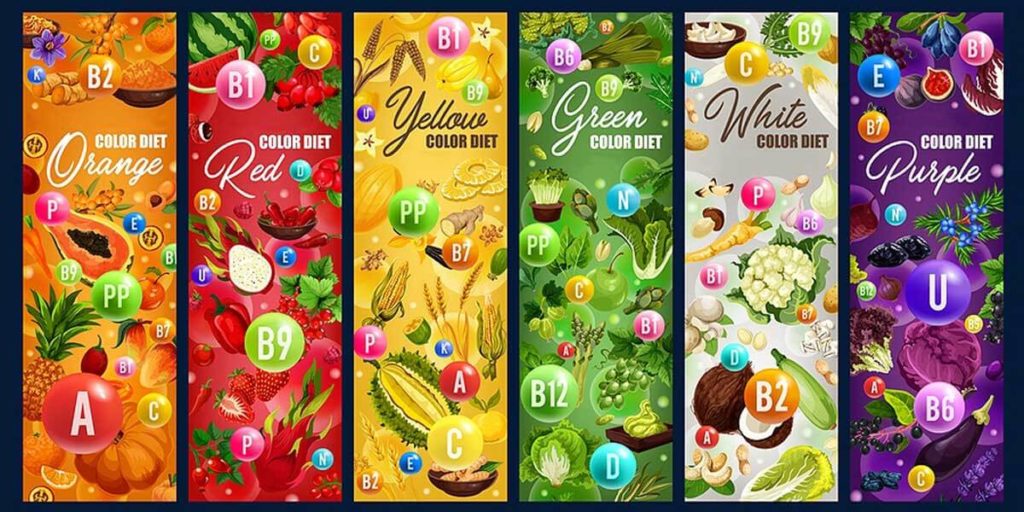
The popular advice of nutritionists to “eat the rainbow” comes from the many colors in fruits and vegetables which are produced by cofactors, and many diagnosed “vitamin deficiencies” are actually cofactor deficiencies.
Is There Still a Need for Synthetic Vitamins?
Synthetic ingredients still have their place in dietary supplements. Sometimes in order to achieve a well-established, efficacious potency within a product, it is necessary to supplement the naturally occurring active ingredients with a synthetic form. When this is necessary, the ideal solution would be to ferment the synthetic ingredient with the Whole Food base, so it is integrated and better recognized as food. As an example, the FDA recommends that “(w)omen who are or who may become pregnant should consume 400 to 800 micrograms of folic acid daily”. This is a permissible health claim (that both the FDA and CDC advocate as necessary) that cannot be met through Whole Food alone. To provide a product that is actually beneficial for this consumer, additional amounts of “synthetic” Folate would be added into the Whole Food blend.
3 Reasons to Carry Whole Food Supplements
- Bioavailability. In general, the term bioavailability relates to how easily a component (vitamin, mineral, enzyme, etc.) is for the body to absorb and utilize. Food-based supplements are much more likely to supply the bioavailable forms of these nutrients, because they are made with the most natural sources: food or food concentrates.
- Complexity. Because they are made with food-derived compounds, these types of supplements include the valuable phytonutrients, cofactors, and other elements that deliver nutrients as a whole rather than as a fragmented piece, making the actives more effective and efficient. In fact, a study published in The American Journal of Clinical Nutrition found that the synergistic effects of these components as a whole are responsible for their potent antioxidant and anti-cancer activities.
- Transparency. In a post-COVID world, and even before, there has been a growing consumer demand for transparency in their supplements. This has only been magnified by the focus on maintaining a healthy base in an effort to not get sick and has resulted in a growing awareness of the added health benefits provided by “whole”, “natural” ingredients. Offering non-synthetic formulas is a great way to support the needs and demands of the consumer to provide an assurance that the product they are taking is healthy and beneficial to them.
➤ Learn More About the Massive Market Growth in Whole Food Supplements
†These statements have not been evaluated by The Food and Drug Administration. This product is not intended to diagnose, treat, cure or prevent any disease.


